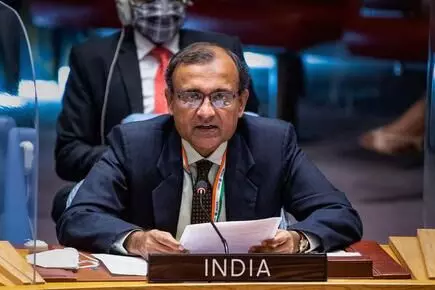
Ukraine: India's geo-political tightrope walk
text_fieldsIndia's Permanent Representative to the UN, TS Tirumurti (file photo)
India was among the 35 countries that abstained from the UN General Assembly vote on the resolution criticizing Russia's invasion of Ukraine. India had taken a neutral position in 2014 also when Russia invaded Crimea. In the UN Security Council, India abstained from a resolution condemning Russian military action in Ukraine, but expressed its unhappiness over Russia's action. India also abstained from a vote against Russia in UN Human Rights Council and International Atomic Energy Agency (IAEA).(Not taking sides: On India and the Ukraine conflict, 2022) India's policy of abstaining in international forums on issues of conflict between nations has become a common feature of Indian foreign policy in the recent past.
India's positioning on the war is an indication that in geopolitics, strategic interests override principles. This shift in India's policy is a response to the changing global order, increasing Chinese influence and protecting India's interests.
Rationale behind India's decision
India's pro-Russian tilt can be seen as the need of the time. Since India is not being directly involved or affected by the war, it does not find a reason to take an anti-Russian position. For India, the imminent concern is the multi-faceted threat of China. India requires the support of both the western world and Russia to deal with the Chinese conundrum.(Jacob, 2022)
The India-US relationship is at an all-time high. The formation of QUAD (Quadrilateral Security Dialogue comprising Australia, India, Japan and the US) and AUKUS (the pact including Australia, the United Kingdom and the United States) reiterates that the USA has set its focus in the Indo-Pacific to contain China. At the virtual meeting of the QUAD, USA, Japan, and Australia directly criticized Russia's unilateral move to force changes. But India only spoke of establishing humanitarian assistance in Ukraine and did not criticize Russia. India has managed to stay on the edge but being a member of QUAD, India will be pressurized to join the western narrative of war.
Russia has historically been an ally of India. It is our strategic partner, the principal source for military hardware and technology, and the most dependable permanent member (P-5) in the UN Security Council. Over years Russia's vetoes were vital in protecting India's interests in Kashmir. It is important from the Indian point of view to ensure that Russia stands for India on Kashmir if Pakistan, backed up by China brings the issue to the UN. (Gharekhan, 2022)
India, being in good relation with both Russia and the west was asked by the Ukrainian ambassador to India to meditate with Putin to halt the military action. Prime Minister Narendra Modi called Putin, and asked for an immediate ceasefire and to solve the differences between Russia and NATO through honest and sincere dialogue. Under these circumstances, India has been forced to do a balancing act. This is visible in India abstaining from votes against Russia and at the same time disapproving violence and calling for negotiations.
The Chinese conundrum
The US-led unipolar global order is being challenged by China. An aggressive China is one of the reasons for the blossoming Indo-US relationship. For India, the rise of a global power geographically right above the head has complicated India's position in the continent. Russia is in fact the only dependable partner for India in the subcontinent as others have become states dependent on China. With the American withdrawal from Afghanistan and an assertive China in the neighbourhood, it is more vital than ever for India to be in the good books of Putin.
On a larger plane, Asia in the near future is set to witness a contest between superpowers trying to establish continental versus maritime supremacy. China is choking India by hoisting Beijing-friendly regimes in Afghanistan, Pakistan, Sri Lanka, and Bangladesh, whereas India's support structures in the region seek to establish a maritime-based order. India does not have a partner in the neighbourhood to tackle the Chinese crisis. This underlines the importance of having Russia on India's side. Russia is also India's point of access to the Central Asian republics and Afghanistan. To put it short, Russia is India's only friend in the entire continent.
Effects on India's interests
Both China and Russia have territorial ambitions. If Putin manages to achieve his objectives in Ukraine, that could boost China's plans for Taiwan and the disputed territories along the Line of Actual Control (LAC). A prolonged war will bring China and Russia even close to each other. China will be Russia's first option to tackle the economic sanctions imposed by the west. Since the economic sanctions imposed on Russia after the annexation of the Crimean Peninsula in 2014, they have been moving away from the dollar mainly to Yuan and Euro. Russia has developed an alternative to the Society for Worldwide Interbank Financial Telecommunications (SWIFT) called System for Transfer of Financial Messages (SPFS). SPFS could join hands with its Chinese counterpart called Cross Border Interbank Payment System (CIPS) to ease the impact of economic sanctions.
For Indian policymakers, the serious concern with the current crisis will be the shift of focus from the Indo-Pacific to Eastern Europe. For the past couple of years, the area of the discourse centred around containing China. This has benefited India since both India and the West share mutual concerns about China. Finally, the delivery of Russia's S-400 defence system which is due shortly could be affected by the recent developments. USA had exempted India from sanctions under Countering America's Adversaries through Sanctions Act (CAASTA) for the purchase of S-400. However, considering India's position on the issue, U.S.A might reconsider its earlier decision.
The Ukraine war has placed India in a unique situation, necessitating it to tread a middle-of-the-road path. But what must caution India is that hard power has triumphed over soft power. An aggressive China might follow a path no less gruesome than Russia. Finally, if the conflict continues for a prolonged period, India's diplomacy will have a hard time choosing between principles and national interests.
(The author is currently pursuing Masters in Politics and International Relations from Pondicherry Central University. His areas of interest are election studies and border studies)
References:
- Gharekhan, C. R. (2022, March 2). The Ukraine war, India and a stand of non-alignment. Retrieved from The Hindu : https://www.thehindu.com/opinion/op-ed/the-ukraine-war-india-and-a-stand-of-non-alignment/article65156505.ece
- Jacob, H. (2022, February 28). The anatomy of India's Ukraine dilemma. Retrieved from The Hindu: https://www.thehindu.com/opinion/lead/the-anatomy-of-indias-ukraine-dilemma/article65090424.ece
- Not taking sides: On India and the Ukraine conflict. (2022, March 4). Retrieved from The Hindu : https://www.thehindu.com/opinion/editorial/not-taking-sides-the-hindu-editorial-on-india-and-the-ukraine-conflict/article65187973.ece
- The Wire Staff. (2022, March 2). The Wire. Retrieved from At UN General Assembly, India Abstains From Resolution Criticising Russian Actions In Ukraine: https://thewire.in/diplomacy/un-general-assembly-india-abstain-resolution-criticise-russia-ukraine-invasion





